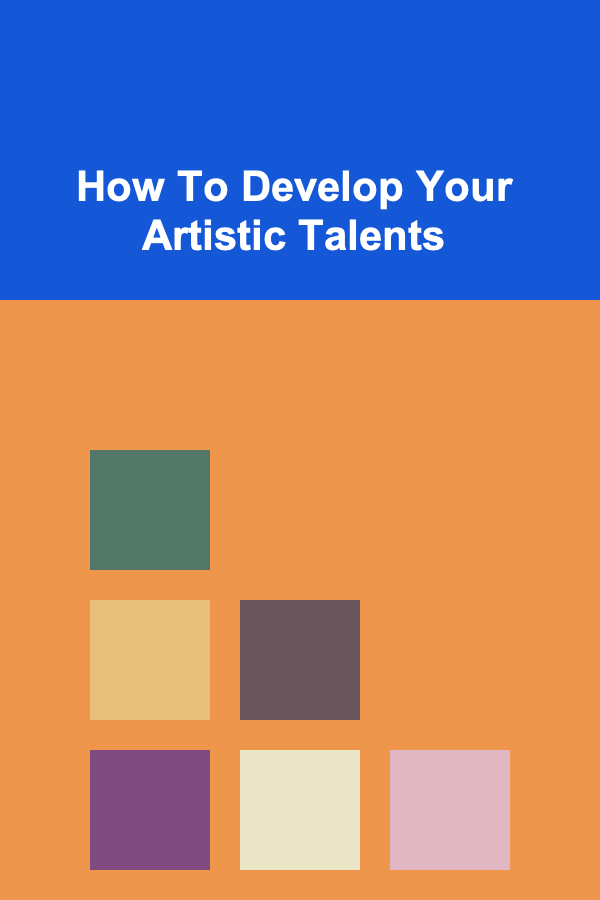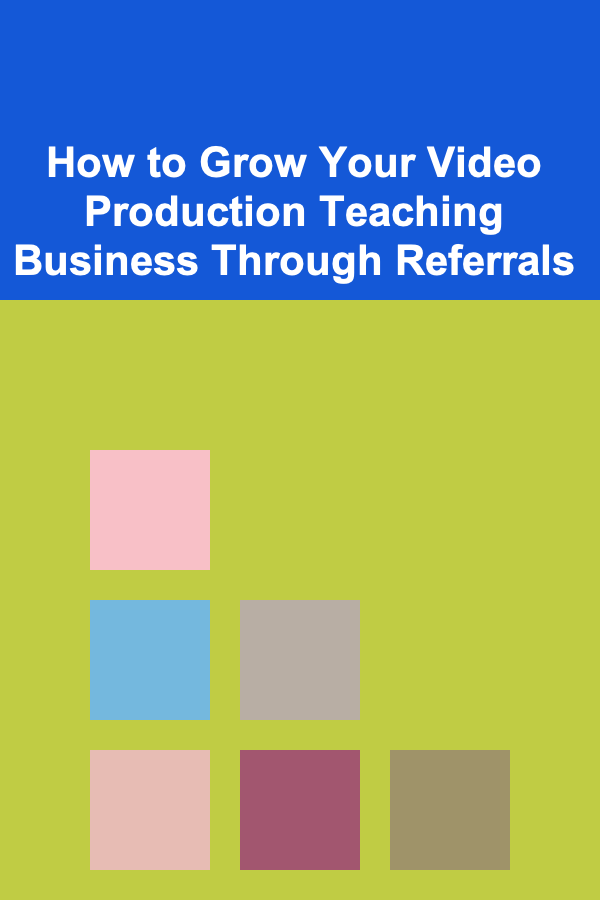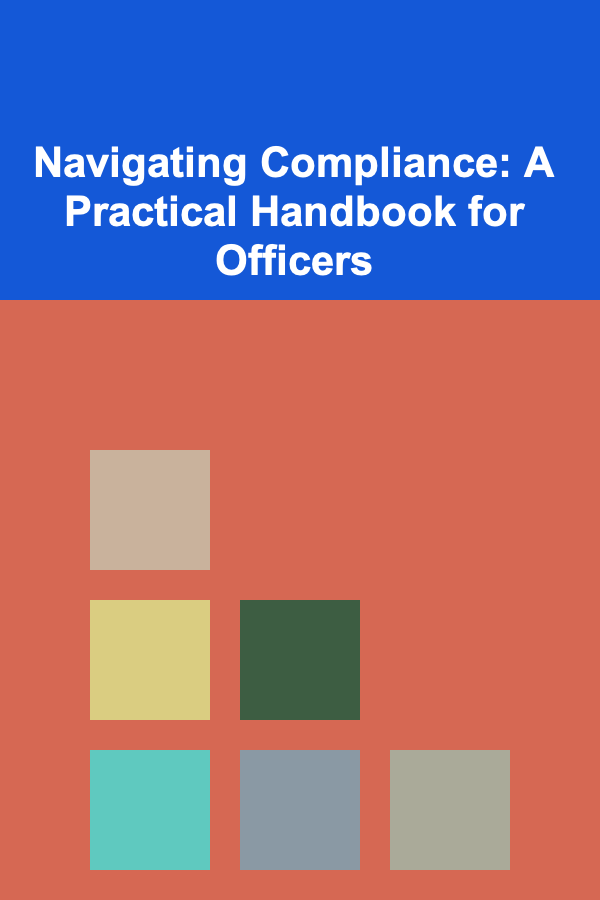
How To Develop Your Artistic Talents
ebook include PDF & Audio bundle (Micro Guide)
$12.99$7.99
Limited Time Offer! Order within the next:

Art is an intrinsic form of expression that can take on numerous forms, from painting and sculpture to dance and music. The ability to create art, whether it is visual, auditory, or performance-based, is often seen as a natural gift. However, while some individuals may be born with a predisposition towards artistic talents, the truth is that anyone can develop their artistic abilities. It requires dedication, practice, and a willingness to explore and experiment with different mediums and techniques. This article will provide a deep dive into the ways to develop your artistic talents, offering insights into the processes, tools, and mindsets necessary to unlock and enhance your creativity.
Understanding Artistic Talent
Before diving into the practical steps of developing artistic talents, it's essential to define what artistic talent truly is. Artistic talent can be seen as the ability to interpret and express ideas through various forms of art. It can manifest in different ways, from natural drawing skills to a keen sense of rhythm in music or a talent for understanding color theory. However, artistic talent isn't solely about innate ability; it is also about how much time and effort you invest in refining your skills and nurturing your creativity.
The Myth of Innate Talent
Many people believe that artistic ability is something you are born with, and that those who are naturally good at art are simply lucky. While some individuals may have a natural aptitude for artistic skills, the reality is that art is largely about practice and patience. Just as with any other skill, the more you practice, the more your abilities will improve. Talent, therefore, is often the result of persistent effort rather than a natural gift.
Cultivating a Creative Mindset
The first step in developing your artistic talents is to cultivate a creative mindset. Creativity is not limited to artistic fields but can be applied to problem-solving and thinking outside the box in everyday life. For artists, creativity is the fuel that drives innovation and expression.
Overcoming Creative Blocks
One of the most significant challenges in artistic development is overcoming creative blocks. Every artist, no matter how experienced, will face moments when they struggle with inspiration. However, understanding that creative blocks are normal can help you navigate through them. Here are some strategies to overcome them:
- Take a Break: Sometimes, stepping away from your work and taking a break can provide a fresh perspective. Engage in a different activity, like walking or listening to music, to clear your mind.
- Experiment with New Techniques: If you're feeling stuck, try exploring a new medium or technique. This can open up new pathways of creativity and bring excitement back to the process.
- Embrace Imperfection: Allow yourself to make mistakes. Art is often about trial and error, and mistakes can lead to unexpected discoveries.
Developing Curiosity
To develop your artistic talents, it's essential to foster a sense of curiosity. Artists are, by nature, inquisitive and always looking for ways to improve their craft. Curiosity leads to exploration and experimentation, both of which are crucial for artistic growth. Engage with various forms of art, from literature and sculpture to photography and film. This broader exploration can help you understand different artistic expressions and how they relate to your work.
Mastering the Basics
While creativity is important, developing technical skills is equally crucial in honing your artistic talents. Every form of art has its own set of techniques and rules that artists must understand to create meaningful work. These skills may take time to develop, but they provide the foundation for more advanced techniques and personal expression.
Learning the Fundamentals of Your Chosen Medium
Each medium of art, whether painting, sculpture, dance, or music, requires specific skills and knowledge. Learning the fundamentals of your chosen medium is essential to developing your talents. Here are some examples of what to focus on for different types of art:
- Visual Arts (Painting, Drawing, Sculpture): Mastering drawing techniques, understanding composition, learning color theory, and becoming familiar with different materials and tools are foundational skills for visual artists. Start with basic exercises like drawing still lifes or studying anatomy for figure drawing.
- Music: For musicians, understanding rhythm, harmony, and melody is essential. Learning to read music, developing your ear, and mastering your instrument are all critical steps in the process of becoming a skilled musician.
- Dance: Dancers must focus on balance, posture, coordination, and flexibility. Developing a strong foundation in basic movements will allow you to progress to more advanced choreography and personal expression.
Practice, Practice, Practice
No matter which artistic medium you choose, practice is key to improvement. It is important to practice consistently and challenge yourself with new techniques and ideas. Set aside regular time for practice and make it a priority, even when progress feels slow. Over time, your skills will improve, and you'll find that certain techniques become second nature.
Experimenting and Finding Your Voice
As you continue to practice and develop your technical skills, it's essential to experiment with different styles, approaches, and ideas. This experimentation is vital for discovering your unique voice as an artist.
Trying Different Styles and Approaches
If you're a visual artist, try creating works in different styles, such as realism, abstraction, or surrealism. Experiment with various color schemes, brush techniques, and materials to see how each affects the final piece. Musicians can explore different genres or styles, such as classical, jazz, rock, or electronic music, to see which resonates with them most.
This experimentation allows you to refine your personal style and can help you discover new ways of expressing yourself. Additionally, it broadens your knowledge of art, helping you draw inspiration from a variety of sources.
Seeking Feedback
While experimenting with your style, it's helpful to seek feedback from others. Feedback from fellow artists, mentors, or an audience can offer valuable insights and help you grow as an artist. However, it's important to remember that not all feedback will be constructive, so take it with a grain of salt. Use feedback as a tool for growth, but also trust your instincts and vision.
Studying the Masters
One of the best ways to improve your artistic talents is to study the work of great artists who have come before you. Analyzing their techniques, understanding their creative processes, and learning about their personal journeys can provide valuable lessons for your own development.
Learning from History
Study the works of artists from various periods, including the Renaissance, Impressionism, Modernism, and contemporary movements. By understanding the different styles and philosophies of these artists, you can gain a deeper appreciation for the evolution of art and apply these lessons to your own work.
Attending Exhibitions and Performances
Visiting art galleries, museums, concerts, and theater performances can help you appreciate the nuances of various art forms. Seeing art in person can often be a transformative experience, allowing you to connect with the work on a deeper level.
Building a Supportive Environment
The environment in which you create plays a significant role in developing your artistic talents. Surrounding yourself with a supportive community can provide motivation, inspiration, and the encouragement needed to continue improving your craft.
Joining Artistic Communities
Participating in artistic communities, whether online or in person, can help you stay motivated and inspired. These communities often provide opportunities for collaboration, feedback, and learning. They can also introduce you to new ideas and artistic trends that you may not have encountered on your own.
Finding a Mentor
Mentorship can be an invaluable tool in developing your artistic skills. A mentor can offer guidance, share their experiences, and provide constructive feedback on your work. Finding someone whose work you admire can help you refine your skills and push your artistic boundaries.
Developing Patience and Persistence
Artistic development is not an overnight process. It takes time, patience, and persistence to develop your talents. You will encounter challenges, moments of self-doubt, and periods of slow progress. However, persistence is the key to improvement.
Embracing the Process
Instead of focusing solely on the outcome, learn to embrace the process of creating art. Artistic growth is a journey that requires you to step out of your comfort zone and take risks. Be patient with yourself and enjoy the evolution of your artistic expression.
Setting Long-Term Goals
To stay motivated, set long-term goals for your artistic development. Whether it's mastering a particular technique, completing a large body of work, or exhibiting your art publicly, setting achievable goals will help you stay on track and measure your progress.
Conclusion
Developing your artistic talents is a rewarding and transformative process. It requires dedication, practice, and a willingness to explore new ideas and techniques. By cultivating a creative mindset, mastering the basics, experimenting with different styles, seeking feedback, and building a supportive environment, you can unlock your full artistic potential. Remember, artistic talent is not a fixed attribute---it's a skill that can be developed and refined over time. Embrace the journey, and let your creative expression flourish.

How to Get the Best Return on Investment (ROI) from Your Rental Property
Read More
How to Grow Your Video Production Teaching Business Through Referrals
Read More
How to Organize Your Work from Home Setup for Comfort
Read More
How to Plan for Retirement in Your 30s: A Step-by-Step Guide
Read More
Navigating Compliance: A Practical Handbook for Officers
Read More
How To Interpret Your Carrier Status for Genetic Diseases
Read MoreOther Products

How to Get the Best Return on Investment (ROI) from Your Rental Property
Read More
How to Grow Your Video Production Teaching Business Through Referrals
Read More
How to Organize Your Work from Home Setup for Comfort
Read More
How to Plan for Retirement in Your 30s: A Step-by-Step Guide
Read More
Navigating Compliance: A Practical Handbook for Officers
Read More